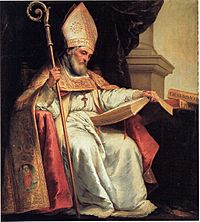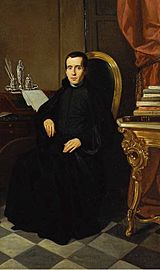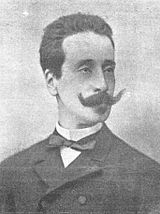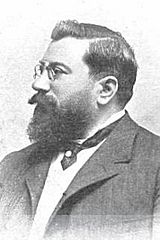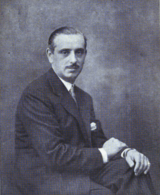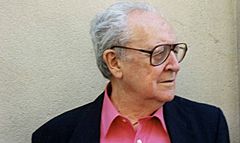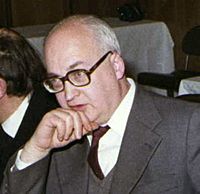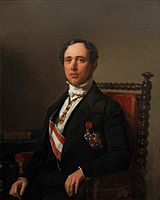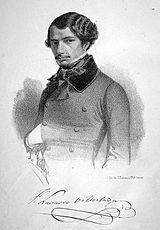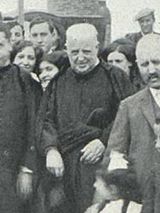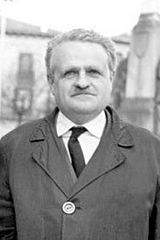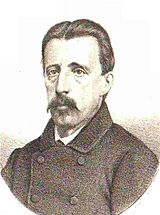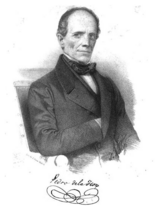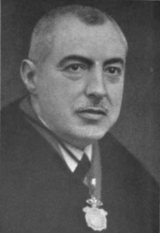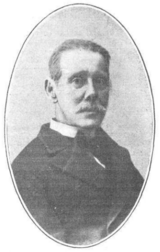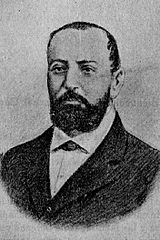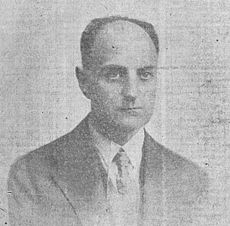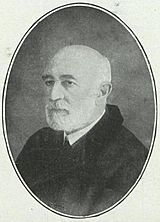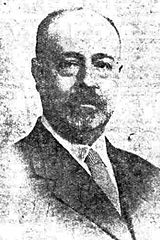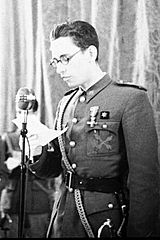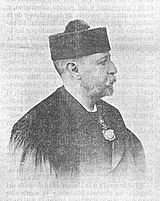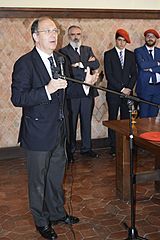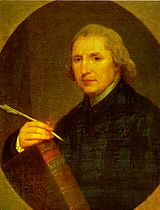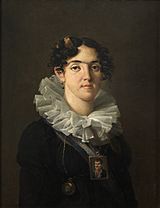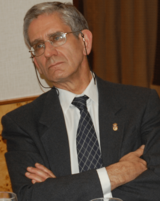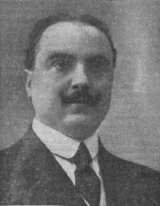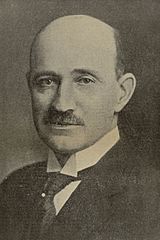Traditionalism (Spain) facts for kids
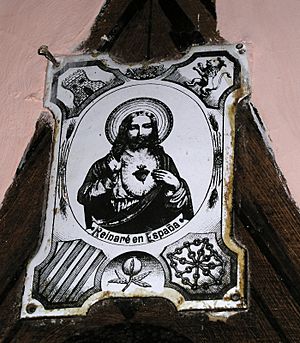
Traditionalism (Spanish: tradicionalismo) is a political idea from Spain that started in the early 1800s. It believes that politics should follow the teachings of Jesus Christ. This means Catholicism would be the official religion of Spain. Catholic rules would guide public life and all laws.
In practice, Traditionalism supports a monarchy (a country ruled by a king or queen) with strong royal powers. However, these powers would have some limits. Society would be organized into groups like families and guilds, not just individuals. This idea was used by the Carlist movement, but it also appeared in other groups. Traditionalism never had a huge impact on Spanish governments, but it sometimes led to large public movements.
Contents
History of Traditionalism
Spanish Traditionalism is one of the oldest political ideas still talked about today. It began in the late 1700s. The idea became very strong at different times:
- In the 1840s and 1850s, with thinkers like Jaime Balmes and Juan Donoso Cortés.
- In the 1890s and 1900s, with Enrique Gil Robles and Juan Vázquez de Mella.
- In the 1950s and 1960s, with Francisco Elías de Tejada and Rafael Gambra.
The idea also influenced real politics during the time of Ramón Narváez (1840s-1850s), Miguel Primo de Rivera (1920s), and Francisco Franco (1940s-1950s).
Early Ideas
Most people agree that Spanish Traditionalism started in the 1800s. But some think its roots go back much further. Some scholars link it to the very beginnings of Spanish political thought. They point to the works of Isidore of Seville from the 6th century. These early ideas helped shape how Traditionalists understood power and politics. They believed power came from Christian and natural order.
Other thinkers believe Traditionalism started later, in the 1700s. This was when people began to oppose the modernizing changes brought by the Bourbon kings from France. These kings wanted a stronger, more centralized government. Critics like Manuel Larramendi spoke out against this. They wanted to keep traditional local ways.
However, the most common idea is that Traditionalism truly began after the French Revolution in 1789. This event led to the idea of "counter-revolution." Thinkers like Francisco Alvarado and Rafael de Vélez argued against the revolutionary ideas. They based their arguments on Spanish traditions. The first political text seen as Traditionalist is the 1814 Manifiesto de los Persas.
The Isabelline Era
When King Fernando VII died in 1833, it caused a crisis and a civil war. This was the First Carlist War. Don Carlos, the king's brother, claimed the throne. His supporters, called Carlists, were very conservative. They were against the Liberal ideas of Queen María Cristina's side. Most scholars call these supporters Carlists, not Traditionalists, at this early stage.
True Traditionalism is often seen as starting in the 1840s and 1850s. Two important thinkers, Jaime Balmes and Juan Donoso Cortés, developed similar ideas. They tried to fit traditional Catholicism into the constitutional system of Queen Isabel II. Balmes tried to bring Carlists and Isabel's supporters together. Donoso Cortés was strongly against the Carlists. He even thought a dictatorship might be needed if society faced a huge threat, like the 1848 events in Paris. Donoso's ideas were known across Europe. He helped write the 1845 constitution. The term "Traditionalist" began to appear in public discussions in the 1850s.
In the 1860s, the ideas of Isabel's supporters and the Carlists became more similar. This was thanks to a group called neocatólicos. They included politicians like Antonio Aparisi Guijarro and Cándido Nocedal. They tried to save the monarchy by making it more Traditionalist and less Liberal. When their efforts failed, many of them joined the Carlists. This was the first time a Traditionalist organization, called Comunión Católico-Monárquica, was formed.
War and Restoration
In the 1870s, Traditionalism was put to the test during the Third Carlist War. The Carlists controlled some areas and set up their own government. Their main motto, still used today, was "Dios – Patria – Rey" (God – Homeland – King).
However, Traditionalism and Carlism were not fully merged. Some Traditionalists, like Alejandro Pidal y Mon, accepted the Liberal government of the Restoration period. They hoped it would protect Catholic unity. More importantly, in the late 1880s, a group called the Integrists broke away. Led by Ramón Nocedal, they focused only on religious matters. They were very strict against the Restoration government. The Integrists were the first to call themselves "Traditionalists."
Marcelino Menéndez Pelayo was a very important scholar of late 19th-century Traditionalism. He saw Traditionalism as a cultural idea, defending Catholic beliefs. He was a historian and literary critic. Politically, he was close to the Conservatives.
Around 1900, two new figures, Enrique Gil Robles and Juan Vázquez de Mella, updated Traditionalist thought. They both offered complete political ideas. Gil Robles wrote a long book, while de Mella's ideas came from his many writings and speeches. De Mella became a famous politician and was seen as the main Carlist thinker for about 25 years. In 1919, he broke away and formed the Partido Católico-Tradicionalista.
Dictatorship Era
Juan Vázquez de Mella was the top authority on Traditionalist thought until his death in 1928. He didn't like the dictatorship of Primo de Rivera. However, his student, Víctor Pradera, supported Primo de Rivera. Pradera became one of the dictator's main advisors. He tried to get Traditionalist ideas into the government.
During the Republic in the early 1930s, different Traditionalist groups existed. The Carlists reunited under the name Comunión Tradicionalista. When the Civil War started, some new Traditionalist ideas emerged.
In the late 1930s and 1940s, the Traditionalist movement was confused. Francoism (the system led by Francisco Franco) claimed to combine all Spanish political ideas, including Traditionalism. Some Traditionalist ideas were used in the new Spain. But the Carlists, who were marginalized, said Franco's system was not truly Traditionalist.
Traditionalism started to revive in the late 1940s. New thinkers like Rafael Calvo Serer and Francisco Elías de Tejada appeared. In the mid-1950s, Carlist thinkers like Elías de Tejada and Rafael Gambra brought Traditionalism to its highest intellectual level. They wrote many important works in the 1960s and 1970s.
Traditionalism Today
After Franco's death, Traditionalism remained a small force in Spanish politics. Many Traditionalist writers from the Franco era continued to publish. A new generation of scholars, like Miguel Ayuso Torres, also started writing. They focused on organizing existing Traditionalist ideas.
Today, there are several Traditionalist groups and institutions. The main political groups are Comunión Tradicionalista Carlista (CTC) and Comunión Tradicionalista (CT). The CTC does not support a specific royal claimant, while the CT supports Sixto Enrique de Borbón. The CTC follows official Vatican teachings, while the CT is closer to the FSSPX form of Catholicism. Both groups have websites, publish materials, and sometimes take part in elections.
Important non-political Traditionalist groups include Fundación Ignacio Larramendi and Fundación Elías de Tejada. They publish magazines, organize events, and are active online. Some well-known Traditionalist magazines are Verbo and Aportes. Online, Traditionalism is present through many websites, blogs, and forums.
What Traditionalism Believes
Traditionalism has been around for over 200 years. Its core idea is that politics should be about putting the teachings of Jesus Christ into practice in society. This means having a Catholic monarchy with a strong king. This king's power would be limited by traditional rules and local groups. Society would be organized into different communities, not just individuals.
Power and Monarchy
Traditionalist ideas start with the belief that God created everything and is the ultimate lawmaker. They believe humans developed best when following God's rules. Public power, like a monarchy, came from this natural development. Kings were seen as having legitimate power because it came from human and social growth, guided by God's spirit.
Traditionalists believe that a king should lead the political structure. They generally think that power should belong only to the king, not shared with a nation or other groups. However, they also strongly believe that a king's power is not unlimited. A king must rule within strict limits set by:
- Natural law (God's order).
- The fundamental laws of Spain.
- The self-governance of groups within society.
If a king goes beyond these limits, he can be seen as a tyrant and even overthrown.
Religion in Society
Traditionalism is centered on God. It believes that all human order must be based on God, as taught by the Roman Catholic Church. The goal of politics is to create a society that strictly follows Christian principles. An ideal Traditionalist monarchy is seen as a defender of Christianity. It also aims to spread Christian values.
Some people think Traditionalism is a theocracy (ruled by religious leaders). However, Traditionalist thinkers say that a king and other non-religious groups should rule, not the Church directly. They believe the state and the Church should be separate institutions. But they also think the Church should influence politics. They supported the Church having a role in government bodies.
Traditionalists believe the state and Church should not be completely separate. The Traditionalist monarchy is a Catholic state. This means the Church gets political and financial support from the state. In return, the state gets spiritual support from the Church. They believe there should be no freedom of religion or freedom of press for non-Catholic views. Other religions are allowed only if practiced privately.
Traditionalist views on religion were different from Conservative, Liberal, or Christian Democratic ideas. They also clashed with the official views of the Vatican in the mid-20th century. Even today, some Traditionalist groups are sympathetic to very traditional forms of Catholicism.
The State's Role
Traditionalists don't focus much on the idea of a "state." They see the state as a structure that serves society, not the other way around. They criticize ideas that make the state all-powerful, like totalitarian regimes.
They believe the state should be a "lightweight" structure. It should only handle tasks that smaller groups in society cannot do themselves. These tasks include foreign policy, defense, money, and justice. This idea is called subsidiarity, meaning decisions should be made at the lowest possible level.
Traditionalists believe the Spanish state developed naturally over centuries, shaped by history and tradition. When they talk about a "constitution," they usually mean this historical process, not a written document. They reject the idea of a social contract or that the people are the ultimate source of power. Instead, they believe the state's principles are defined by traditional "Fundamental Laws." These laws are not agreements but results of natural development.
For Spanish Traditionalists, the idea of "Spain" was sometimes vague. They often referred to "Las Españas" (the Spains), meaning different regions or even overseas territories. This showed their focus on local identities and shared values, rather than a single, unified state. They saw Spain's role as spreading Christianity, not just conquering lands.
How Society Works
Traditionalists believe society is made up of many natural groups, not just individuals. The family is the most important group. These groups are organized in a layered structure. Individuals are seen as members of these communities first, not as isolated people. Traditionalists strongly disagree with Liberal ideas that focus on individuals and their personal freedoms. They also reject the concept of "human rights" as understood by Liberals.
Traditionalists believe society formed over time through historical development. They reject the idea of a "social contract" where people agree to form a society. They also believe society should be united by common Catholic beliefs. Unlike Liberal societies, which allow many different moral systems, Traditionalist society has one shared truth.
Traditionalists favor a hierarchical society with different social groups, like guilds or corporations. These groups are united by their roles or interests. This idea emphasizes order and roles, rather than social mobility where everyone is equal.
A key idea from the late 19th century was "social sovereignty." This meant that local communities and groups (called cuerpos intermedios) should be self-governed within their own limits. The king, state, or government should not interfere with them. This made the Traditionalist state like a federation of different local areas, professional groups, or associations. Each would govern itself with its own rules. Traditionalists also rejected the idea of "national sovereignty," which they saw as a revolutionary idea.
How People are Represented
Even though Traditionalists believe all political power rests with the king, his power is limited. He must consider the opinions of the cuerpos intermedios (local groups). Sometimes, these groups would just be consulted. Other times, their opinions would be formally part of decision-making. In extreme cases, they could even disobey or reject an illegitimate ruler.
Traditionalists believe that representation should come from these local groups, not from individual votes. They called this "organic representation." They thought individual voting was a flawed Liberal idea that led to corruption and didn't truly represent society's interests. However, some Traditionalists did accept some forms of elections, usually with strict rules. The main bodies for representation were the Cortes (parliament) and the Royal Council.
Traditionalism and democracy are generally seen as incompatible today. Traditionalism believes power comes from God, while democracy believes it comes from the people. Traditionalists often saw democracy as unstable. However, some Traditionalist thinkers believed democracy could work at the local level, like in a town. They rejected popular parliamentary elections because they didn't think they were truly democratic.
Traditionalists were usually against tyrannical rulers. But some did accept a temporary dictatorship in extreme situations, as a last resort.
Fueros: Local Laws and Traditions
Fueros are traditional laws and customs specific to certain regions or towns in Spain. In early Traditionalist writings, fueros were not a big focus. But as Liberal governments tried to get rid of these local laws to create a more uniform state, fueros became very important to Traditionalists. By the late 1800s, bringing back fueros was a core part of their beliefs.
Traditionalists see fueros as the basic rules that make up a state, not just special privileges given by a central government. Fueros can apply to any local area, from a town to a larger region. They believe that each area can have its own unique laws and customs. This is because fueros reflect the local identity, history, culture, and habits of a place.
Traditionalists always tried to make sure their idea of local identity was not confused with other concepts. For example, fuerismo focused mainly on the Basque Country and Navarre. Regionalismo (regionalism) was accepted only if it was based on fueros, not just geography or economy. Some Traditionalists even called themselves "federalists" and saw Spain as a federation of regions.
However, they generally rejected "autonomy" as it implies a top-down approach from the state. They also strongly opposed separatism, which aims to break away from Spain. In modern Spain, Traditionalists see independence movements, like the Basque political movement, as a major enemy.
Economy and Work
Traditionalism doesn't have a detailed economic theory. Their ideas on economy are often general or fragmented. Early Traditionalists opposed changes that came with the rise of capitalism. They defended large religious landholdings, which were being taken by Liberal governments. These lands were often available to rural people at low cost. But new owners used them for profit, which Traditionalists saw as "anti-capitalist."
They also opposed the end of guilds (groups of skilled workers), which they wanted to bring back even 100 years later. Traditionalists were generally against urbanization and industrialization.
Over time, some Traditionalists accepted private property as important, especially for rural family farms. But they never fully abandoned the idea of collective ownership or management. In rural areas, this meant focusing on shared lands like pastures. In industry, it meant trying to create a "family-like" atmosphere in businesses, with employers and employees working together.
After the Pope's encyclical Rerum novarum (a letter about social issues), some Traditionalists accepted that capitalism was the main way to produce goods. However, they still supported sharing wealth to solve social problems. Today, some Traditionalist leaders express "hatred of capitalism." Their official party programs suggest a regulated free-market economy focused on the common good.
Foreign Relations
Throughout history, Spanish Traditionalists have supported countries they felt were ideologically similar. In the mid-1800s, they sympathized with states in Italy. These states were fighting against Liberal revolutions. When these states fell, and the Papal State was abolished in 1870, Traditionalists saw it as a blow to European order.
After this, Traditionalists began to look to Russia. Russia had shown some support for the Carlists during their civil wars. The Carlist claimant, Carlos VII, even visited Russia. Later, his son Don Jaime joined the Russian army. Traditionalist thinkers like Enrique Gil-Robles saw Russia as a protector of tradition against modern changes.
As Europe's conflicts grew, more Carlists looked to Germany. They saw Germany's rise as a challenge to the "decadent" French-British alliance. During World War I, most Carlists supported the German Empire. However, a minority, including the claimant, supported France. This split caused a major crisis in the movement.
Between the World Wars, Traditionalists hoped for anti-democratic governments like those in Portugal and Italy. Some Carlists even trained in Fascist Italy. During World War II, there were both pro-Axis and pro-Allies groups within the Carlists. Eventually, they adopted a policy of not getting involved.
During the Cold War, Carlists saw the Communist block as their main enemy. But they also didn't see the democratic, secular Western countries as allies. They looked for a "third way," sometimes showing interest in countries like Yugoslavia.
After the Cold War, anti-Western feelings grew among Traditionalists. They disliked consumer society and new cultural movements like LGBT rights and feminism. In the 21st century, some Traditionalists became fascinated with Putin’s Russia. They see it as a defender of traditional values. When the Russian-Ukrainian war started, some Traditionalist groups supported Russia's side.
Traditionalism and Other Ideas
Spanish Traditionalism has existed for over 200 years. It has always been strongly against ideas it sees as revolutionary, like Liberalism, Socialism, Communism, and Anarchism. But its relationship with other political ideas is more complex.
Traditionalism and Absolutism
Sometimes, people talk about "Carlist absolutism" or "absolutist Traditionalism." This usually refers to the early 1800s. For example, the Manifiesto de los Persas praised "absolute monarchy." However, most scholars say Traditionalism and Absolutism are very different.
Traditionalism actually emerged partly from unhappiness with the growing absolutist reforms of the 1700s. Traditionalists believed the king's power was limited by divine law, justice, and the state's fundamental rules. Absolutists, on the other hand, saw the king as the source of public power. Traditionalists wanted to return to an older system, not the "ministerial despotism" of the late 1700s.
Traditionalism and Carlism
Most historians agree that Traditionalism and Carlism are closely linked. Traditionalism is the political idea, and Carlism is the social and political movement that adopted it. Carlists themselves say Traditionalism is one of their three main pillars, along with dynastic legitimacy and Spanish historical continuity.
However, Traditionalism also appeared outside of Carlism. Some scholars argue that Carlism is the most important example of Traditionalism. Others say that mainstream Traditionalism was not Carlist. There are many different views on how closely the two are connected.
The terms "Traditionalist" and "Carlist" have sometimes been used confusingly. This happened when groups broke away from mainstream Carlism and claimed to be the true Traditionalists. Also, during the dictatorships of Primo de Rivera and Franco, the term "Traditionalism" was sometimes used to replace "Carlism." This was done to hide the existence of other political groups and to make the regimes seem more traditional.
Traditionalism and Conservatism
In real politics, Spanish Conservatives were often at odds with Traditionalists. However, there were times when they worked together, especially with non-Carlist Traditionalists.
Traditionalism is sometimes called Conservative or even Ultra-conservative. But many scholars say they are distinct.
- Traditionalism is based on religious principles and divine revelation. Conservatism, while often respectful of religion, is not centered on it.
- Traditionalism aims to achieve Catholic goals in politics. Conservatism is more about the technique of governing.
- Traditionalism has a core set of unchanging beliefs. Conservatism is more flexible and can evolve.
- Traditionalism is against democracy. Conservatism can work within a democratic system.
- Traditionalism is monarchist. Conservatism can accept different forms of government.
- Traditionalism comes from Spanish cultural tradition. Conservatism is more universal.
- Traditionalism sees society as made of organic groups. Conservatism sees it as made of free individuals.
- Traditionalism believes public power is united. Conservatism believes it should be divided into legislative, executive, and judicial branches.
Conservatives usually accept being called "Right-wing." Traditionalists, however, are uncomfortable with this label. They argue their ideas come from a time before the "Right-Left" political divide even existed (before 1789).
Traditionalism and Fascism
In some online discussions, Traditionalism is sometimes wrongly called "Fascism." However, in academic studies, this view is very rare. While there were some brief moments of cooperation between Traditionalists and Fascists or Nazis (like Carlists training in Italy), most detailed studies highlight their differences.
Traditionalists were against Fascism for many reasons:
- Fascism was foreign and didn't fit Spanish tradition.
- Fascism believed in an all-powerful state, which Traditionalists opposed.
- Fascism often marginalized religion, and Nazism was openly anti-Christian.
- Fascism focused on social engineering and heavy industry, which Traditionalists disliked.
- Fascism emphasized nationalism, raising the nation or ethnicity to a god-like status. Traditionalists saw this as wrong.
- Fascism promoted racism, which Traditionalists associated with separatist ideas.
- Fascism had a strong "leader principle," which Traditionalists saw as almost blasphemous.
- Fascism promoted central control and uniformity, destroying local identities.
- Fascism was a modernizing movement, which Traditionalists generally opposed.
Traditionalism and Francoism
The name of Franco's state party, Falange Española Tradicionalista, might suggest that Traditionalism was central to Franco's political ideas. Many agree that Traditionalism did influence Francoism, especially after the early 1940s. Some believe Franco's regime was closer to Traditionalist ideas than any other, particularly from 1944 to 1957.
However, Traditionalist thinkers, especially those linked to Carlism, argued that Franco's system was completely incompatible with true Traditionalism. They pointed out many differences:
- Francoism was nationalist, while Traditionalism was about non-ethnic patriotism.
- Francoism was centralized, while Traditionalism supported regionalism and diversity.
- Francoism had a strong leader (Caudillo) instead of a king.
- Francoism had an all-powerful state, while Traditionalism wanted a limited state.
- Francoism had a single party, while Traditionalism wanted no parties.
- Franco's Cortes (parliament) was based on personal appointments, not true organic representation.
- Franco's system used syndicates (worker organizations) that Traditionalists saw as a distortion of their guild system.
- Franco's Church was subservient to the state, while Traditionalists wanted the state to serve the Church.
Because of these differences, Traditionalists had a complex and often contradictory relationship with Franco's regime. Their positions ranged from opposition to conditional cooperation.
Images for kids
See also
 In Spanish: Tradicionalismo político (España) para niños
In Spanish: Tradicionalismo político (España) para niños
- Carlism
- Traditionalism (Catholicism)
- Integrism (Spain)
- Carlism in literature
 | Aaron Henry |
 | T. R. M. Howard |
 | Jesse Jackson |


